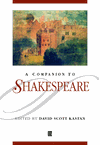Shakespeare and Genre
Summary
Teachers of Shakespeare have typically chosen one of two routes when planning their undergraduate classes. Either they have organized their courses chronologically, beginning with the earliest plays Shakespeare wrote and progressing seriatim through to the last plays. Or they have organized their courses by genre, typically doing history plays and romantic comedies in one term and tragedies and “odd” comedies (problem plays and romances) in the second. Sometimes the two modes of organization are combined, with a few “immature” tragedies such as Titus Andronicus slipped into the first term to lay the groundwork for a “great” revenge tragedy such as Hamlet, or Twelfth Night or Henry VIII appearing on the second-term syllabus to show what happens to romantic comedy and the national history play after the turn of the century. While many teachers and scholars, I think, feel a little uncertain about the ontological status of the problem play and the romance as generic categories, Very few are particularly troubled by using tragedy, history, and comedy as markers of some real categorical differences among groups of plays. The profession has reproduced these differences in its publishing practices. A number of books continue to be written that focus only on Shakespearian tragedy, on the Shakespearian history play, or on Shakespearian comedy. For many critics and students these categories have assumed the status of natural, not arbitrary, entities.



